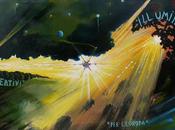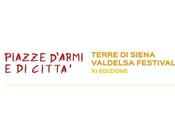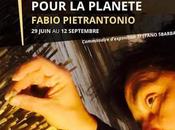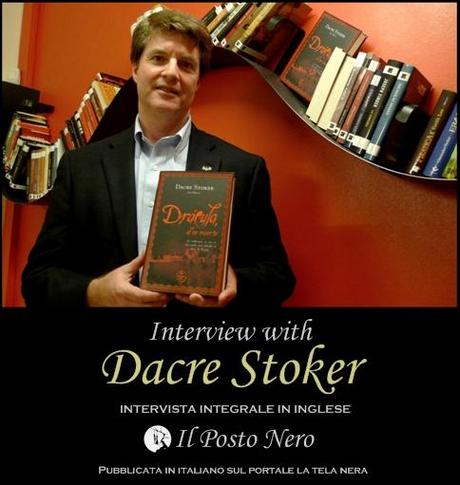
Interview with Dacre Stoker, the author of the novel Dracula The Un-dead and the great-grand nephew of Bram Stoker. The Italian version of the interview is available on La Tela Nera Portal
[Alessandro Manzetti] This is not mere coincidence, you are the great-grandnephew of Bram Stoker. But you haven’t only blood in common with the great master of gothic literature, you have also written Dracula-The Un-Dead, the official sequel to the most famous work of your granduncle, Dracula. What was your occupation before writing? What convinced you to start this challenging adventure?
[Dacre Stoker] I have had a few different jobs in my life leading up to writing Dracula the Un-Dead with Ian Holt. I have been a school teacher and an athletic coach, and also a Director of a Land Conservation Organization. It was Ian Holt who contacted me and convinced me that I should write a story with him. He knew a lot about Dracula movies and suggested that we continue Bram’s story with a sequel, but one that actually gave Dracula a voice and a chance to tell his side of the story.
[Alessandro Manzetti] Is it true that you have consulted your granduncle old notes, found in a library, to elaborate your sequel? What was written in those old pages?
[Dacre Stoker] Bram’s research notes reside in the Rosenbach Museum in Philadelphia USA. They are 125 pages of background notes that Bram wrote over a seven year period when he slowly put his Dracula story together. The most revealing things were that Bram was meticulous in some aspects of his research; the proper whitby dialect for the character Mr. Swales, the train schedules so the timing would be correct for characters to travel from one location to another.This way Bram’s fictional novel had a very realistic feel to it. I found a character who did not make it into Dracula, who became a major part of our story, that was Detective Cotford. It struck me as being very strange that Bram was thinking about having a police presence in his story, especially with all the people who died in his story, but no police ended up in the final version. So it was logical to take one of Bram’s ideas and continue it in our story.
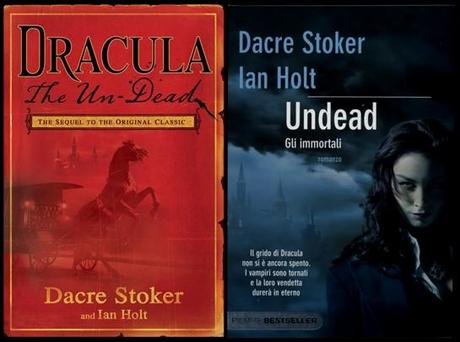
[Alessandro Manzetti] How did react the other Stoker family members when you presented your plans for a sequel to Dracula?
[Dacre Stoker] I contacted Bram’s great grandsons in the UK and my other cousins in Canada and the USA, they were all very supportive of me carrying on the family tradition.
[Alessandro Manzetti] You set the story in London in 1912, we will find many old acquaintances, like Van Helsing and Mina, and locations to which we are accustomed emotionally, but also meet new characters like the Countess Bàthory and Bram Stoker. In addition to differences in plot rather massive in terms of narrative style, atmospheres, characterization, which new interpretations did you take in your Dracula The Un-dead?
[Dacre Stoker] We felt that todays readers would feel more comfortable with a normal narrative style story then the epistolary style that Bram used, which was very popular in the Victorian era. We decided that all of the characters would have changed considerable in the twenty five years since the ending of Bram’s Dracula. The events in Dracula, deaths of close friends and family members, close encounters with supernatural and horrific powers, and denied love interests, would certainly have had an effect on the characters. So even though the locations are similar, the people involved are far more complex and interesting then in the original story. In the original story, the readers really do not get to know much about the characters themselves, or the relationships between themselves, in our story we try to provide this information.
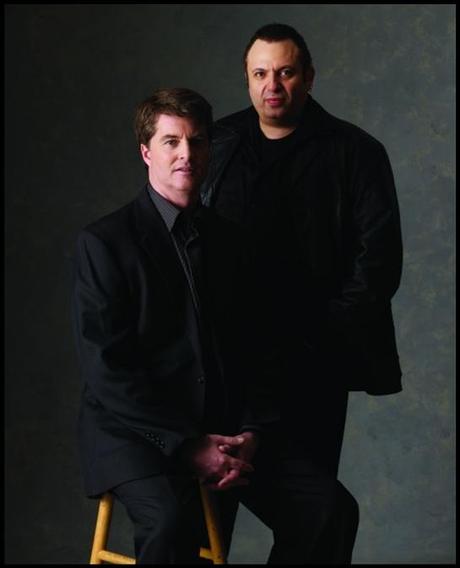
[Alessandro Manzetti] Generally speaking, how would you describe your sequel, Dracula-The Un-dead, a modernization of Dracula or a recovery of its true spirit? Or none of the two? What were the critics that you feared most and what were those that you expected?
[Dacre Stoker] Our story is a combination of a modernization and a continuation of the old classic tale. We certainly take some liberties with the character Dracula; we decided that since so many modern day fans of Dracula identify with the film versions of Dracula, (Lugosi, Lee, Langella, Oldman) we had better merge Bram’s version with a more up to date version. We wanted to retain the aspect of a violent predator, but add in the aspect of a wandering creature desperate for his true love Mina.
[Alessandro Manzetti] Have you inherited your granduncle's passion for the theater? In Dracula-The Un-Dead the son of Mina, Quincey, is engaged in a theatrical transposition of the story of Dracula, and I don’t think it’s a pure coincidence...
[Dacre Stoker] Although I do enjoy the theater, Ian Holt really was the one who developed the character of Quincey.
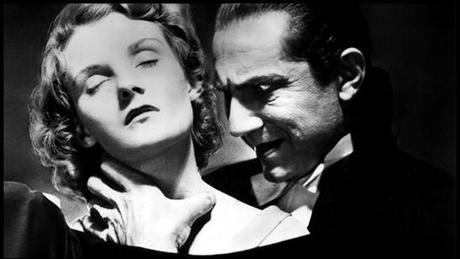
[Alessandro Manzetti] You wrote Dracula-The Un-Dead with Ian Holt, who was his contribution?
[Dacre Stoker] Ian had written a screenplay involving the real Vlad Dracula. He is very knowledgable about every movie ever written about Dracula. So it was his concept to create the sequel giving our “merged” character; the real Vlad and the fictitious Dracula a voice. In Bram’s novel Dracula, the Count was only present for about 30% of the story, but the readers were very much aware of his presence 100% of the time.
[Alessandro Manzetti] What are your favorite novels about vampires, and what is the film dedicated to Dracula that have excited you the most? The film directed by Francis Ford Coppola seems very similar to your novel, for the atmosphere and the development of some themes.
[Dacre Stoker] I really liked the 1931 Todd Browning version of Dracula with Bela Lugosi, and I loved the 1992 Coppola version with Gary Oldman
[Alessandro Manzetti] Will there be a film adaptation of Dracula-The Un-Dead? And a sequel to your sequel?
[Dacre Stoker] I certainly hope so, I think that the story is well suited for the screen. Ian has written a screenplay, but to date no studio has purchased it or the dramatic rights.
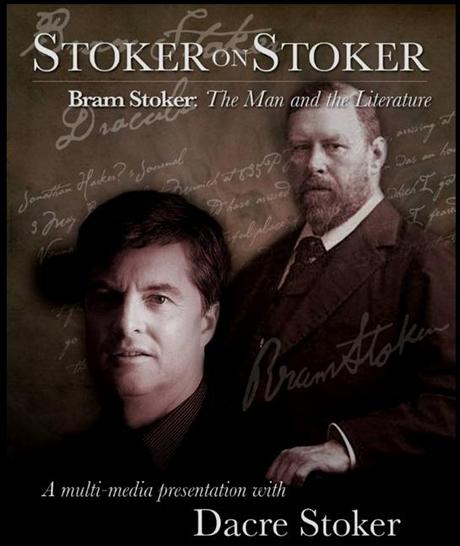
[Alessandro Manzetti] For the last question I ask you a little effort, would you give us a few lines from an unpublished notes or letters by Bram Stoker? If they in someway speak of Dracula, of course ...
[Dacre Stoker] Bram kept a literary Notebook, while he was living in Dublin. I have been working with Dr. Elizabeth Miller for a year on transcribing these notes and writing commentaries on the 305 entries, our book entitled Bram Stokers Dublin Notebook will be published by The Robson Press of London, in March 2012. I can tell you this, we have found enough material which we deem as being very obvious foreshadowing of Dracula to fill a whole chapter. What is interesting is that this Notebook was completed twenty years before he started writing Dracula!
Interview by Alessandro ManzettiHWA Co-ordinator Italy
Read the interview in italian on La Tela Nera
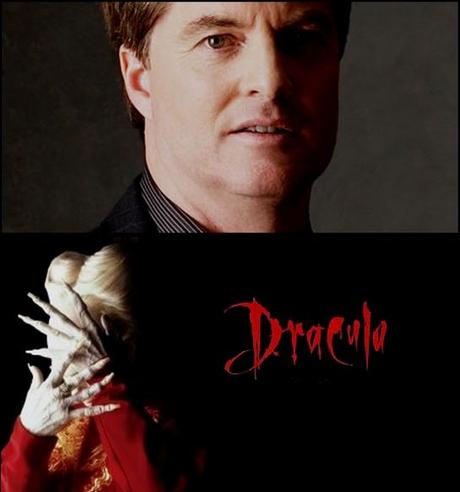
Author ProfileDacre Stoker is the great-grandnephew of the writer Bram Stoker, the author of the novel Dracula, one of the great classics of gothic literature. Dacre Stoker was modern pentathlon world champion and coach of the Canadian pentathlon team at the 1988 Seoul Olympics, lives in South Carolina with his wife and two children. He made his debut as a writer in 2009 with the novel Dracula The Un-dead, the first official sequel to Bram Stoker's Dracula. He wrote the novel in collaboration with writer Ian Holt. Web Site
Dracula The Un-Dead: SummaryTwenty-five years have passed since the band of heroes destroyed Dracula at his castle in Transylvania. Since then, Jonathan and Mina Harker have raised their son Quincey into a fine, if at times naïve, young man, even while their once happy marriage disintegrated. Dr Seward, the brilliant physician, is plagued by drug abuse and mania. Arthur Holmwood, the brave and dashing fiancé to Lucy, is now full of anger and regret. And Van Helsing, leader of the brave band, is a sickly old man. When Quincey leaves law school to pursue his dream of acting, he stumbles upon a troubled production of the play Dracula. This play, with its oddly familiar characters and directed by one Bram Stoker, plunges the young man into the world of his parents’ terrible secrets, but before her can confront them he meets evil that rocks him to his core. One by one, the band of heroes that defeated Dracula is being hunted down. Could it be that Dracula somehow survived and is seeking revenge all these years later? Or, is another, far more sinister villain at work who will put anyone associated with Dracula, including Quincey in grave danger.
